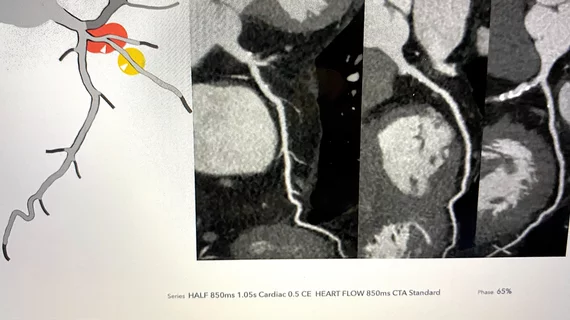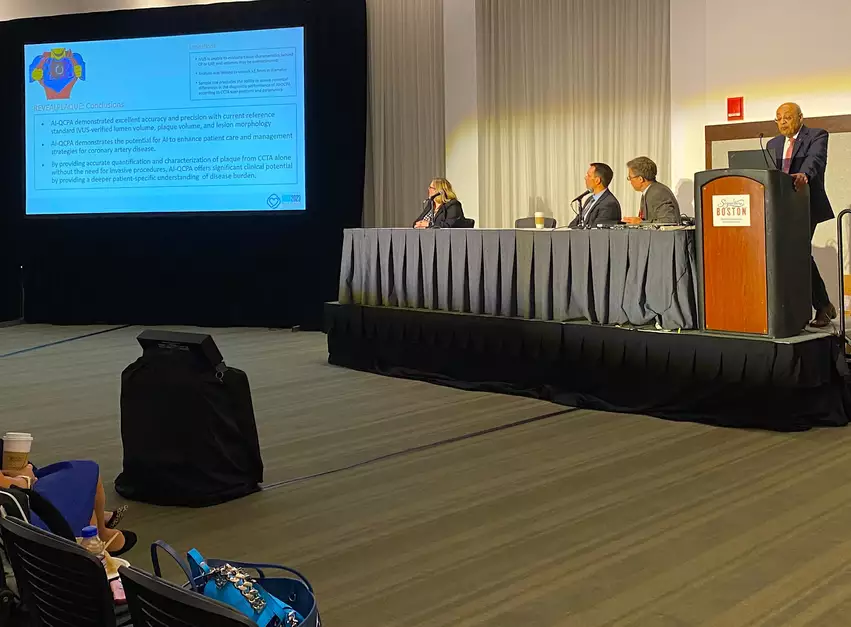Three studies show value of AI to speed cardiac CT reads and soft plaque evaluation
Respective results from the REVEALPLAQUE, DECODE and SMART-CT clinical studies presented at the Society of Cardiovascular Computed Tomography (SCCT) 2023 meeting in Boston demonstrated how new levels of workflow efficiency and accuracy for cardiac CT can be achieved using artificial intelligence (AI) analysis. The three studies were for HeartFlow’s AI algorithms that move beyond FFR-CT to analysis of coronary plaque composition, and the ability to highlight areas of interest where radiologists or cardiologists should spend more time looking in coronary computed tomography angiography (CCTA).
HeartFlow is the first company to offer a suite of AI technologies to help clinicians noninvasively identify stenoses in the coronary arteries (RoadMap Analysis), assess coronary blood flow (FFR-CT Analysis), and characterize and quantify coronary atherosclerosis (Plaque Analysis). Together, this comprehensive solution offers valuable data not currently available with traditional noninvasive diagnostic tools, allowing clinicians to see the full picture of their patients’ coronary artery disease (CAD).
REVEAL PLAQUE Study shows good correlation with IVUS to identify high-risk plaques
The REVEALPLAQUE Study is a large, global, prospective study with independent, blinded, core lab adjudication that demonstrated the accuracy of HeartFlow’s AI-based Plaque Analysis compared to intravascular ultrasound (IVUS) — the current gold standard. The HeartFlow Plaque Analysis demonstrated a 95% agreement with IVUS in quantification and characterization of total plaque volume.
"The take-home message was that in addition to the FFR-CT by coronary CT angiogram, we can now also analyze luminal and plaque volumes and also the plaque morphology in an automated manner with the assistance of artificial intelligence," explained Jagat Narula, MD, PhD, executive vice president and chief academic officer at UTHealth Houston, and president-elect of the World Heart Federation. "The time is ripe to extend the stenosis versus functional significance debate to include plaque morphology."
With this new technology, Narula said it is possible to now more clearly identify patients who should be sent for revascularization and those who can be treated medically, with the technology allowing identification of high-risk plaques.
DECODE Study shows AI plaque analysis can better classify patient risk
The DECODE Study evaluated changes in treatment management decisions made by clinicians using Heartflow’s Plaque Analysis alongside CCTA in comparison to decisions made with CCTA alone. Clinicians using the HeartFlow Plaque Analysis alongside CCTA changed their management decisions for 66% of patients compared to using CCTA alone across various patient presentations and disease stages. Furthermore, nearly 50% of patients with a calcium score of zero were reclassified following clinician review of the HeartFlow Plaque Analysis, highlighting the importance of quantifying total plaque beyond just calcium.
"I think the most important takeaway message is that this can be helpful in making decisions regarding medical therapy, and to identify those who are most likely to benefit from additional medical therapy that is more intense. I think the plaque analysis really surprised us in a way in that it identified noncalcified plaque in in such a subjective way that the reviewing cardiologist may not identify without this objective-based AI algorithm," explained Amit Pursnani MD, director of advanced cardiac imaging, Northshore University Health System, who was the principle investigator of the study.
SMART-CT showed AI helps speed CTA reads
The SMART-CT Study measured the difference in CCTA read time using RoadMap Analysis compared to without RoadMap Analysis in Level 2 and Level 3 CT readers. With the use of the RoadMap Analysis, clinicians read cases 25% faster while maintaining diagnostic accuracy, allowing them to be more efficient. SMART-CT also demonstrated the RoadMap Analysis elevated consistency with reliable CAD diagnoses across all CT readers and amplified their confidence in CCTA reads by over 24%.
"One of the biggest surprises for me was the magnitude in reduction of read times using RoadMap, with an average reduction of about two minutes per case. What that effectively means is that if you are using RoadMap, you can read four coronary CTs in the same time it takes someone not using RoadMap to read three coronary CTs," explained Michael Morris, MD, director cardiac MRI and CT, Banner Health, Pheonix, and co-principal investigator (PI) for the Smart-CT study.
"Regardless of your level of training or where you are in practice, you can still see a benefit from Roadmap with reducing your read times. It will make you a more efface reader with what you do on a daily basis," added co-PI Wesley O'Neal, MD, director of cardiac CT and nuclear cardiology a noninvasive cardiologist at Cone Health heart and Vascular Center, Greensboro, North Carolina.
The company said the results from these clinical studies, along with the launch of HeartFlow’s all-in-one portfolio (HeartFlow ONE), mark a significant milestone in HeartFlow’s mission to build a new standard of care for people at risk of heart disease. Clinicians can now see and gain a full understanding of anatomy, physiology, and plaque — allowing them to evaluate and provide earlier, timesaving, life-altering care that is truly individualized.
“Until now, clinicians have not had access to a complete view of a patient’s heart health with accurate data on coronary anatomy, physiology and plaque. We are thrilled to now offer HeartFlow’s comprehensive solution, supported and validated by the findings of these studies,” John Farquhar, chief executive officer of HeartFlow, said in a statement. “Our company remains committed to empowering providers to make the best clinical decisions by strengthening precision CAD management solutions with the CCTA pathway.”


